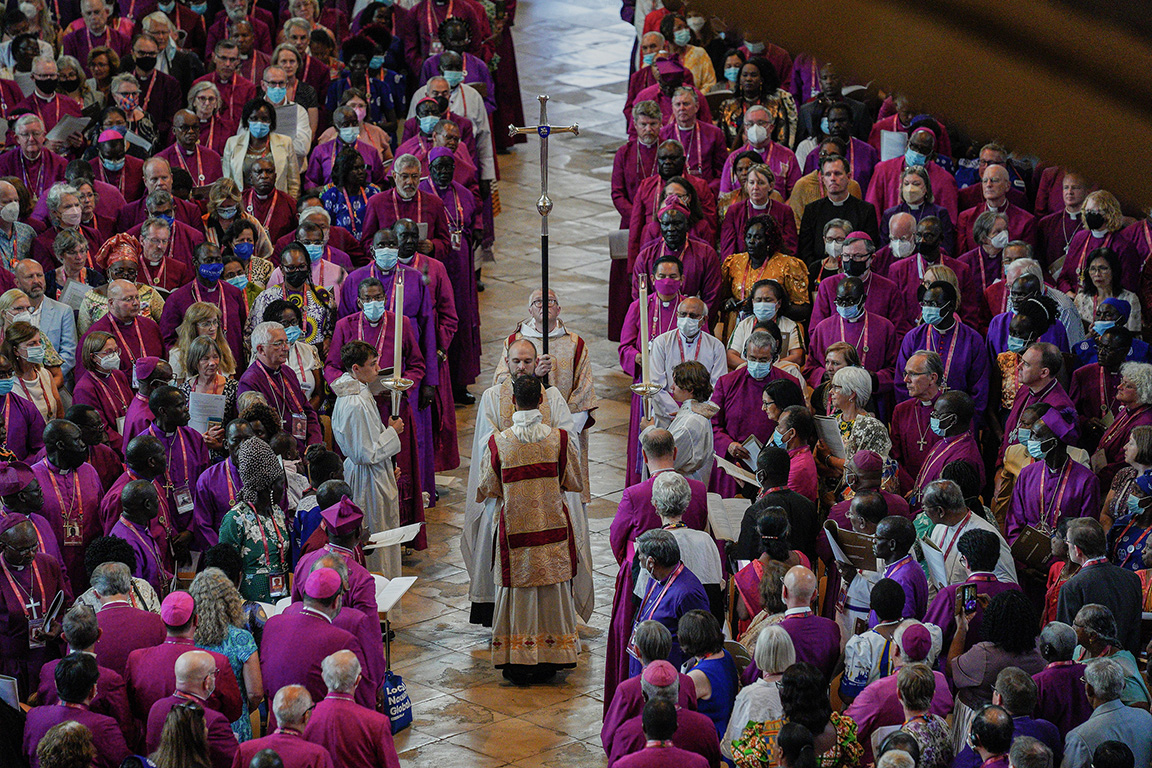
Bishops, their spouses and invited guests during the closing Eucharist of the 2022 Lambeth Conference in Canterbury Cathedral in the United Kingdom on Aug. 7. Photo: Richard Washbrooke/The Lambeth Conference.
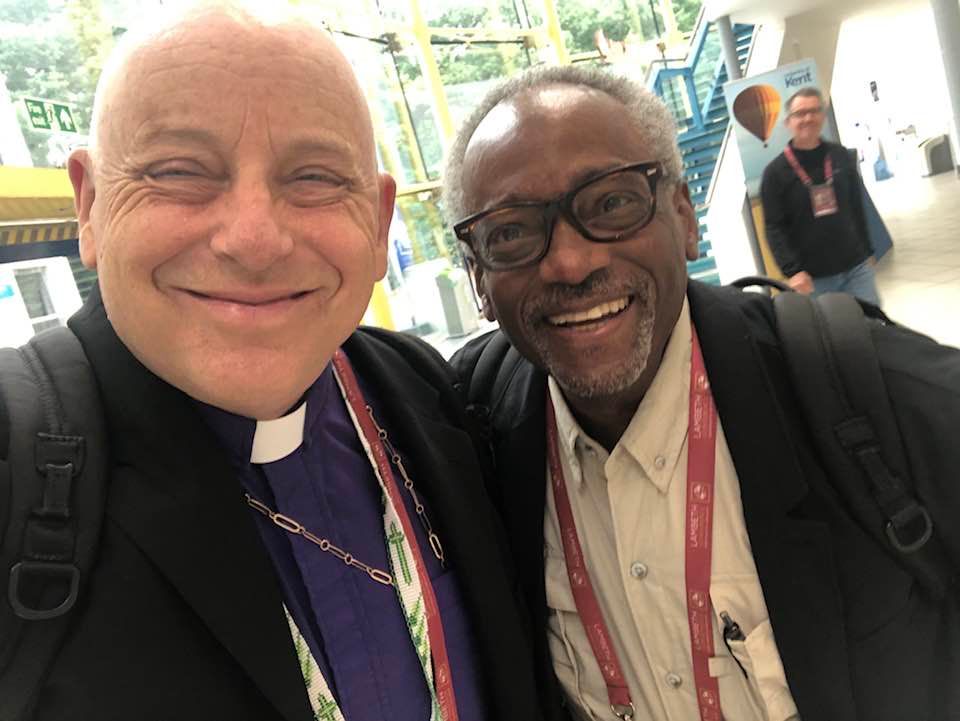
Bishop John Harvey Taylor and Presiding Bishop Michael Curry pose for a selfie at the Lambeth Conference. Photo: John Taylor
[The Episcopal News] Being at the Lambeth Conference was a rich and varied experience for the four Diocese of Los Angeles clergy who attended the July 27 – Aug. 7 gathering: Bishop John Harvey Taylor, attending as one of some 650 bishops from all over the Anglican Communion; the Rev. Ryan Macias, a volunteer steward; and the Rev. Fennie Hsin-Fen Chang and the Rev. Katherine Feng, who served as translators for, respectively, Bishop Lennon Chang of Taiwan and his wife, Hannah Chang.
The bishops engaged in a program of bible study focused on 1 Peter and consideration of the “Lambeth Calls,” a set of statements about issues facing the Anglican Communion and the world: Safe Church, Anglican Identity, Reconciliation, Human dignity, Environment & Sustainable Development, Christian Unity, Interfaith Relations, Discipleship, and Science and Faith.
“First of all, most of all, [it was my responsibility] to listen, and appreciate that I was experiencing the world writ small – at least 165 countries’ worth,” said Bishop Taylor, noting that one of the things that made the Anglican Communion special “is that it’s by and large a community of national churches. It’s a consequence of our roots in the Church of England.” The viewpoints of the bishops at the conference reflected the realities of their political and social situations. “So we spent a lot of time sharing and comparing stories about what was going on at home and what we were trying to do to address it,” said Taylor, adding, “It was also my responsibility to hear all the speeches and participate in daily study and Lambeth Calls sessions.”
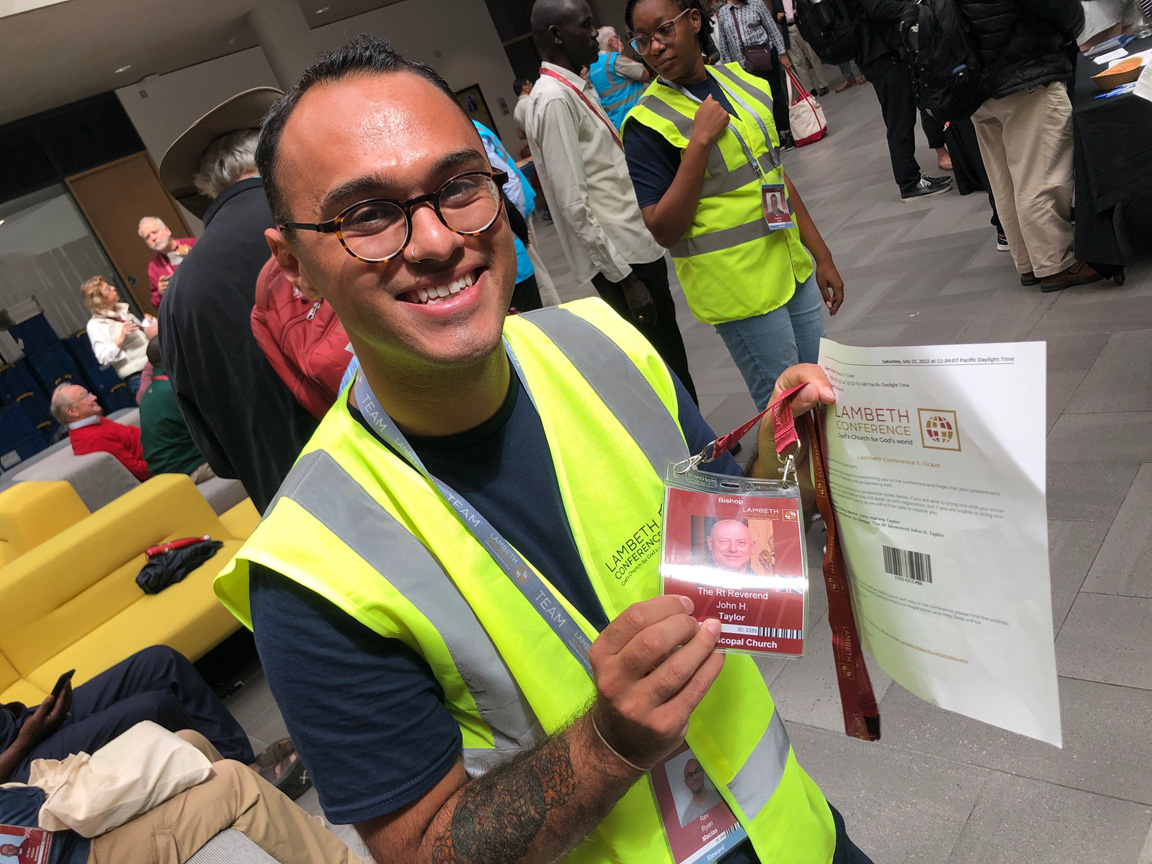
Ryan Macias, curate at All Saints Church, Riverside, was a volunteer steward at the Lambeth Conference. Photo: John Taylor
Forty-nine men and women, ages 20 to 30, from around the Anglican Communion made up the stewarding team, Macias, a recently ordained deacon serving as curate at All Saints’ Church, Riverside, told The Episcopal News. “We represented 22 different countries – places as far wide as Belize, South Sudan, Ghana, Australia, Pakistan, and Barbados.”
The stewards, he said, were “responsible for the logistical aspects of the conference – everything from providing hospitality for delegates, ecumenical visitors, exhibitors and staff, to security and crowd control.” Attendees were housed and many sessions were held at the University of Kent, located a short distance from Canterbury Cathedral. “A big part of the job was helping people find their way around the university’s enormous campus,” said Macias.
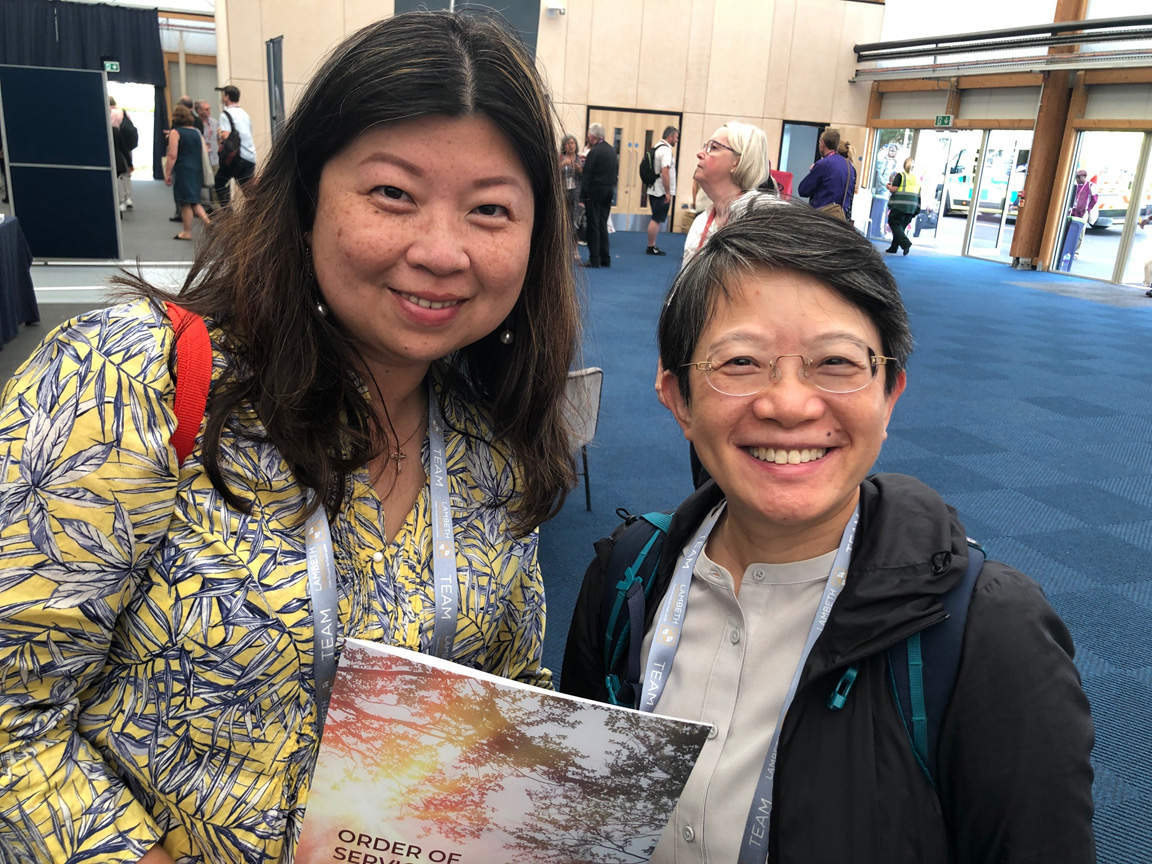
Katherine Feng and Fennie Chang of the Diocese of Los Angeles served as interpreters for the bishop of Taiwan and his wife at the Lambeth Conference. Photo: John Taylor
Taylor said he admired his colleagues’ work at the conference. “It was an inspiration to see Fennie and Katherine working long hours making sure that Bishop Chang and his spouse, Hannah, had the same rich experience as everyone else,” said Taylor. “They didn’t have a booth like the other translators, since the Changs were their only customers. This enabled us to have many fist bumps as we passed on the floor. And every time I turned around, Ryan Macias was offering someone a helping hand and making friends for Christ at the same time.”
Also inspiring was the wide variety of worship services reflecting the multinational, multilingual bishops and others in attendance, especially the “magnificent” opening Eucharist, said Taylor, “featuring 1,200 of us pinching ourselves in unison.”
Feng, who like Macias was ordained to the diaconate in June 2022, and Chang both agreed that worship, especially the opening Eucharist in Canterbury Cathedral, was a high point of Lambeth. “I was especially impressed by the diversity and inclusiveness of the conference through its opening service,” wrote Chang, vicar of St. Thomas’ Church, Hacienda Heights, “in which all the worshipers, regardless of colors or nationalities, were heartily welcomed, and the worship music, whether traditional or contemporary, quiet or vibrant, was so beautifully and harmoniously blended – making me feel that God’s kingdom was truly in our midst.”
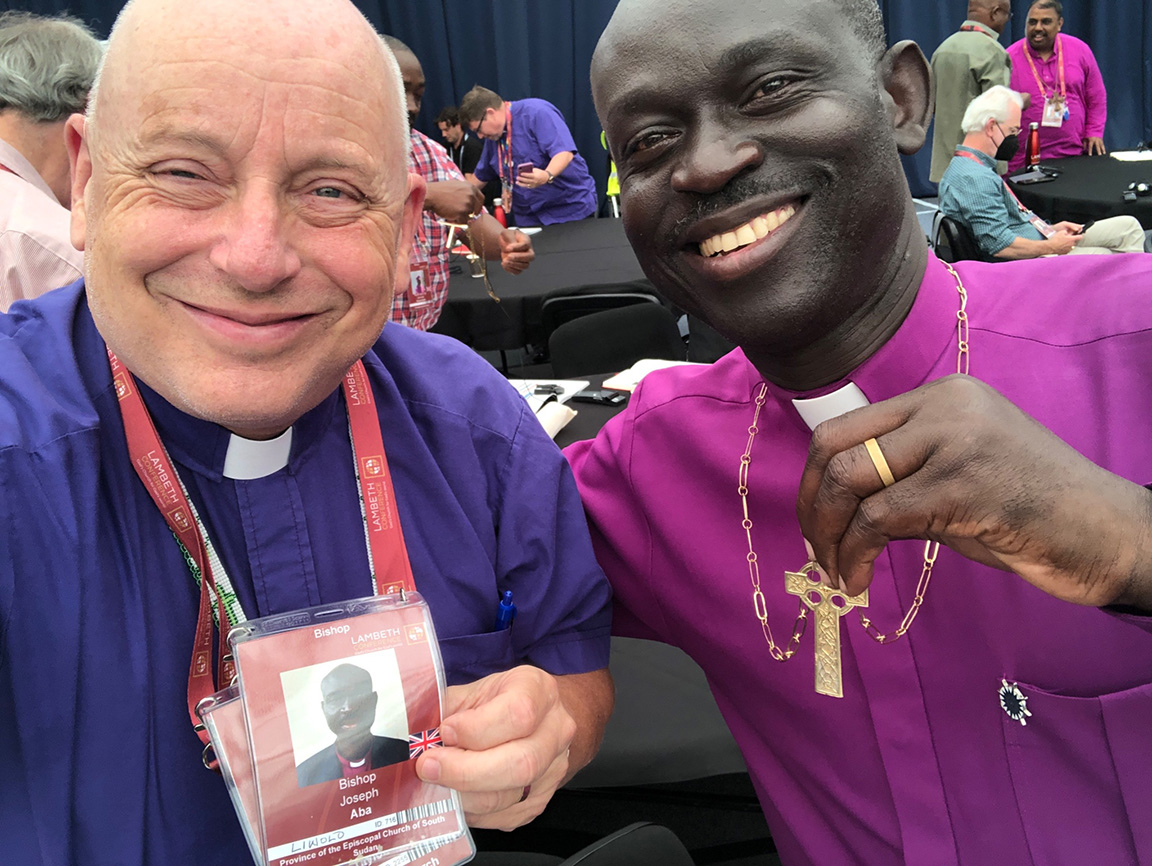
As part of a trust exercise in the plenary session on reconciliation, Bishop John Harvey Taylor and Bishop Joseph Ara of Liwolo in South Sudan swap name tag and pectoral cross for the morning. Photo: John Taylor
Conflict over human sexuality
As news reports from the conference made clear, there were plenty of disagreements among the participants, many of them centered on human sexuality questions contained in the Lambeth Call titled “Human Dignity.”
“It was interesting, from my vantage point as one of the stewards in charge of registration, to watch delegates arrive on that first Monday,” said Macias. “You could feel the sense of apprehension and anxiety for what the coming days would hold. Even the staff was on edge. In my observation, that tension persisted until the following Tuesday, when the Call on Human Dignity was scheduled to take place.
It took a verbal “miter trick,” as Taylor called it, by Archbishop of Canterbury Justin Welby, to soothe the disagreements to at least some extent. In an address to the bishops, Welby acknowledged that provinces of the Anglican Communions have come, after long study, consultation, and prayer, to different conclusion on these issues and that there is not a united “mind of the communion.” The archbishop disavowed any right or desire to issue rulings or sanction provinces for their convictions.
“After Archbishop Justin addressed the delegates on that day,” said Macias, “and we concluded the session with a prolonged time of prayer, it was like the entire conference exhaled an enormous breath that we had been holding on to for far too long.”
The archbishop’s words will have considerable resonance in the future, Taylor said.
“With the incremental breakthrough on marriage equity, with the practice of both the pros and the cons now part of Lambeth’s official record, the Anglican Communion shifted on its axis and became less dangerous to our LGBTQ+ siblings,” Taylor told The Episcopal News after the conference. “As a result, Lambeth in the future, by the grace of God, will be less scary and fraught.”
Some conservative bishops departed the conference still determined to focus on barring same-sex unions and the ordination of LGBTQ+ persons.
“It’s not that the struggle won’t continue,” Taylor said. “But now everyone has firm ground to stand on. Finally, it appears that The Episcopal Church’s long generation in the wilderness, subject to or worried about sanctions from Anglican instruments, is finally over. Archbishop Welby said he has no interest. The church we love is again an equal partner.”
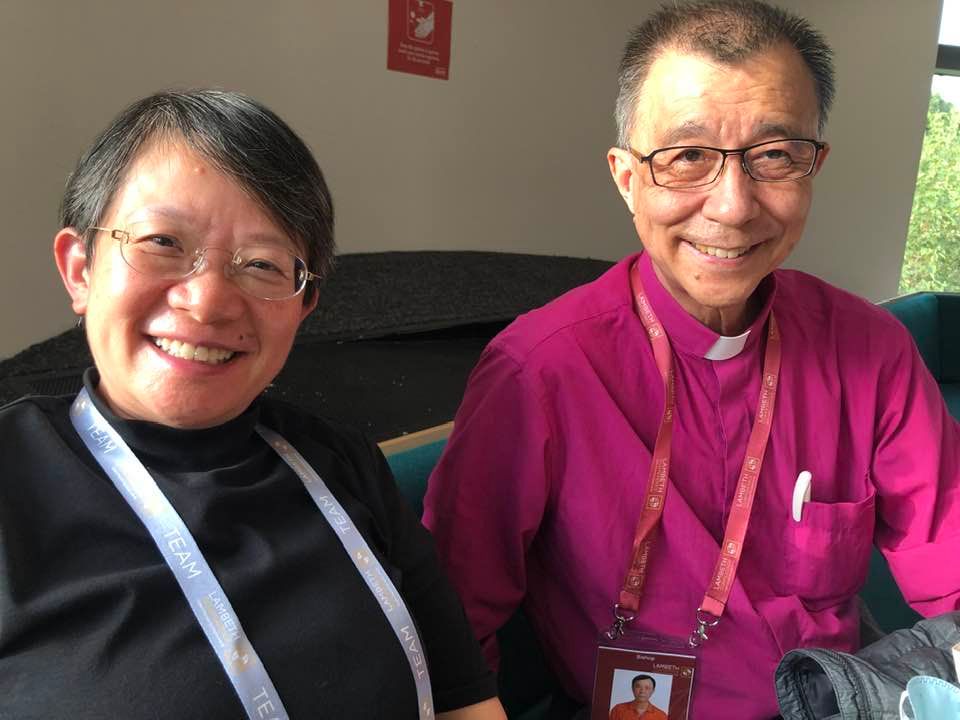
Fennie Chang interpreted for Bishop Lennon Yuan-Rung Chang of Taiwan at the Lambeth Conference. Photo: John Taylor
Ministry in a changing world
The Lambeth Conference usually meets about once per decade, though the last gathering was 14 years ago, in 2008. “I wish the conference could meet sooner,” commented Feng, “because the world changes so much during a 10-year period and we need to gather more often for the wisdom and strength to face the rapid changes.”
Although press reports focused on the disagreements, the bishops spent a great deal of their time in small-group discussion, dealing with each other on a personal level that helped them better understand each other’s ministry challenges.
“Just as the Archbishop of Canterbury emphasized to every attendee, this Lambeth Conference was not meant to reach any agreement or conclusion on whatever issues were discussed,” wrote Chang, “but to provide opportunities for all who were present there to have their voices heard and honored.”
The Los Angeles diocese clergy found encouragement in the Lambeth process and the international encounters, although there were many nuances of thought and flat-out disagreement. They also saw relevance to The Episcopal Church’s ministry in the United States and specifically in the Diocese of Los Angeles.
“I saw God’s children and servants in diversity of race, language, cultural background being called together to listen, share, pray and praise God with love and support in the body of Christ,” said Feng. Noting the diversity of the Diocese of Los Angeles, she added, “We can learn and adapt so much from what we have heard and have seen in the conference.”
“For me, what made this conference meaningful was not only the messages these bishops shared,” wrote Chang, “but more importantly their being together to listen and give support to one another as members of the big family called the Anglican Communion.”
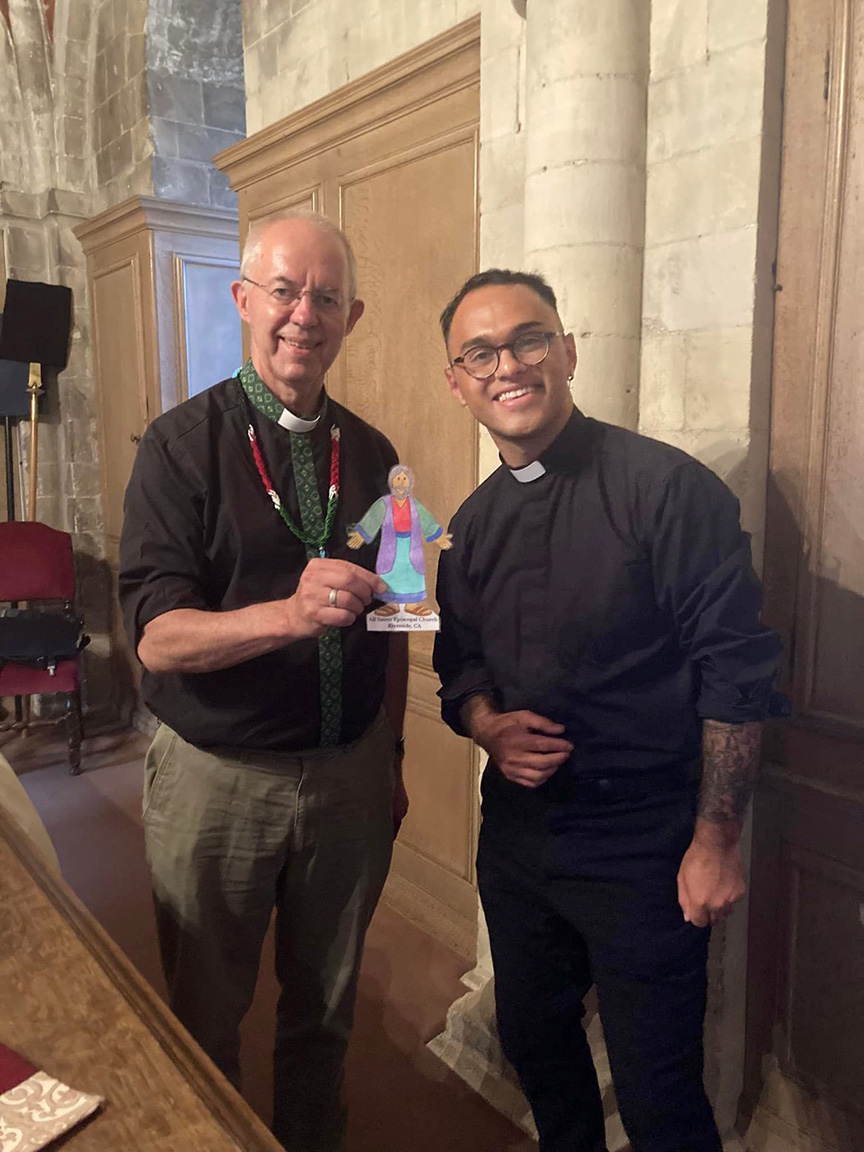
Archbishop of Canterbury Justin Welby and Ryan Macias pose with Flat Jesus, a representation created at All Saints’ Church, Riverside, where Macias is curate. Photo: Courtesy of Ryan Macias
“We had a wonderful plenary session on intentional discipleship – forming Christians to live ‘Jesus-shaped lives,’” said Taylor. “It owes a lot to Presiding Bishop Michael Curry’s ‘Way of Love.’ In my own ministry and life, I find my challenge and opportunity is letting the forgiveness, grace, and love of Jesus Christ guide every action and help me choose every word. We all know how hard that can be! And yet it’s the essence of evangelism to be Christians and form Christians who so express the light and love of Christ that others are drawn closer, and gathered in community, and then set out to do the world of the Holy Spirit. I can’t wait to share these materials with the diocese.”
Prognosis: hope
“On the very last night of the conference, delegates, spouses, and staff were invited to a barbecue out on one of the lawns of the university,” Macias wrote. “There was a live band playing upbeat jazz off to the side, and I will never forget what happened, when a Maasai man [from a Nilotic ethnic group inhabiting northern, central and southern Kenya and northern Tanzania] wearing his shuka, and a South Indian woman wearing her best saree stood up at the same time and started to dance. For a while it was just the two of them, but not long after the entire lawn was full of people from all around the globe, dancing and laughing with one another. For me, that was the moment that the impact of the conference began to sink in.”
With the other stewards, Macias stayed after the conference to attend a special two-day retreat led by Welby, along with Rose Hudson-Wilkin, bishop of Dover (a bishop suffragan serving the Diocese of Canterbury), and Bishop Anthony Poggo of South Sudan, incoming secretary general of the Anglican Communion.
“During our retreat, Archbishop Justin led us in times of prayer, and shared his thoughts on the conference as it had unfolded. He was also very keen to solicit our wisdom, as young leaders from around the world, especially around the topic of reconciliation. Many will know that reconciliation has been an important touchstone within his ministry, even prior to becoming archbishop. That passion for reconciliation was evident to me throughout the entirety of our time in Canterbury, as I observed him facilitate the gathering with excellent pastoral wisdom, and humble leadership.”
As the conference neared its conclusion, Taylor commented in a blog post that he felt the viewpoints of laypersons, priests and deacons of the church were little heard during the proceedings.
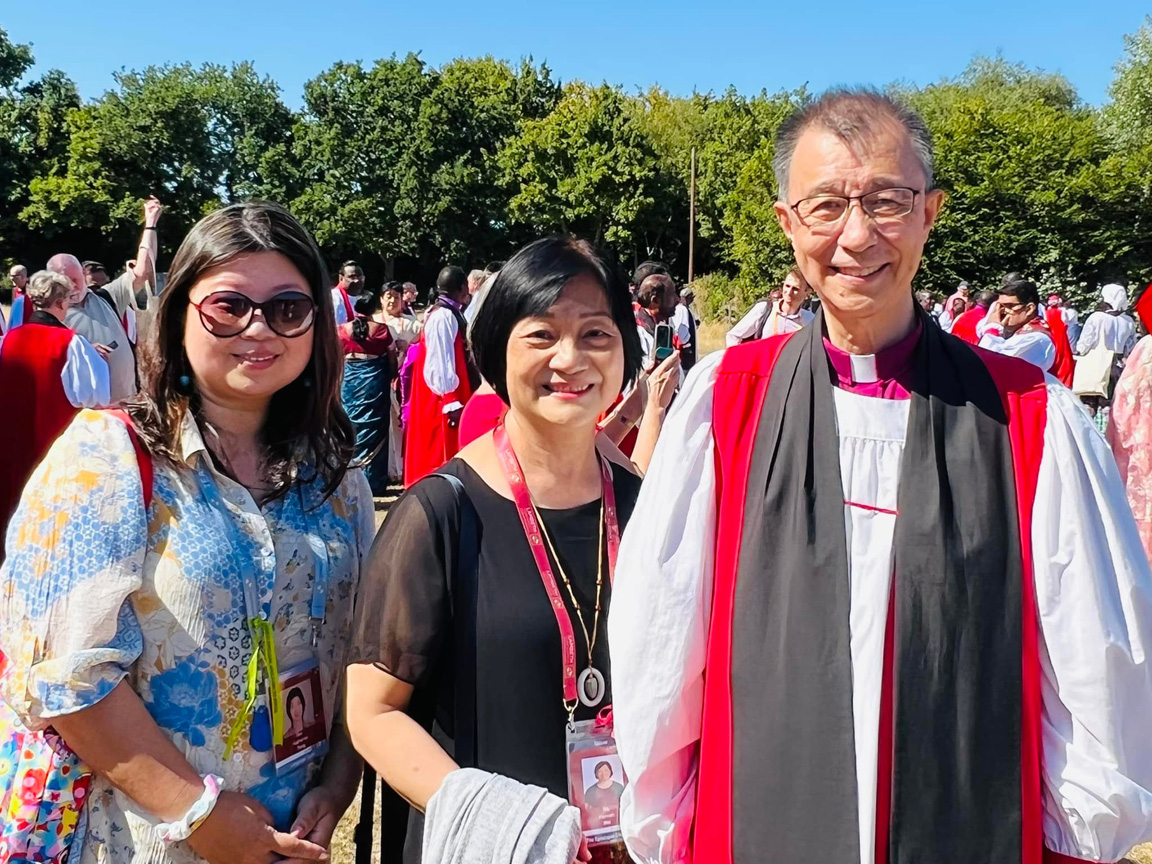
Katherine Feng, left, was an interpreter for Hannah Chang and Bishop Lennon Chang during the conference. Photo: Lambeth Conference
“The historic episcopacy is understood as an apostolic succession from the beginning of the church,” Taylor wrote. “Try as we will to deconstruct it, it is thick with hierarchy and patriarchy. In some parts of the world where bishops are more conservative, they are almost always male, which can’t help but interfere with mutual understanding when it comes to issues of orientation and identification. While this conference placed stress on spouses as bishops’ partners, they weren’t asked to speak in bishops’ plenary sessions except in a pre-taped video or two. Spouses of gay bishops were kept away from formal sessions. The vast majority of spouses are women, most of them mothers. One can only imagine the conversation about orientation and identification in the bishops’ plenaries if women were free to speak and speak freely.”
But overall, the conference was successful in its primary purpose of bringing the Anglican Communion if not into agreement, at least into a bit more understanding and a greater determination to be of service in the world.
“I share the prevailing optimism about the incremental but important step toward a live-and-let-live attitude on marriage equity,” Taylor told The News. “Besides open hearts on all sides, what made it work, I think, was that we never got the impression that Archbishop Welby was motivated by a desire for unity for unity’s sake. Looking at a world at war, the ravages of climate change and socio-economic inequity, and the advance of secularization in some parts of the world, he has a vision of a resurgent Anglican Communion, rolling up its sleeves as chaplain to a world in agony.”
His L.A. colleagues share his optimism.
“Being able to witness this Lambeth Conference is a God-given blessing for me,” said Chang. “I also feel so encouraged and comforted not only through the messages spoken or shared throughout the conference but actually more by the way these bishops communicated with one another, which fully demonstrated the love that enables them to go beyond controversies or differences.”
The most important thing the conference accomplished, said Feng, is that “it called God’s people from worldwide to have bible study and fellowship for a common goal, which is to be God’s church for God’s people.”
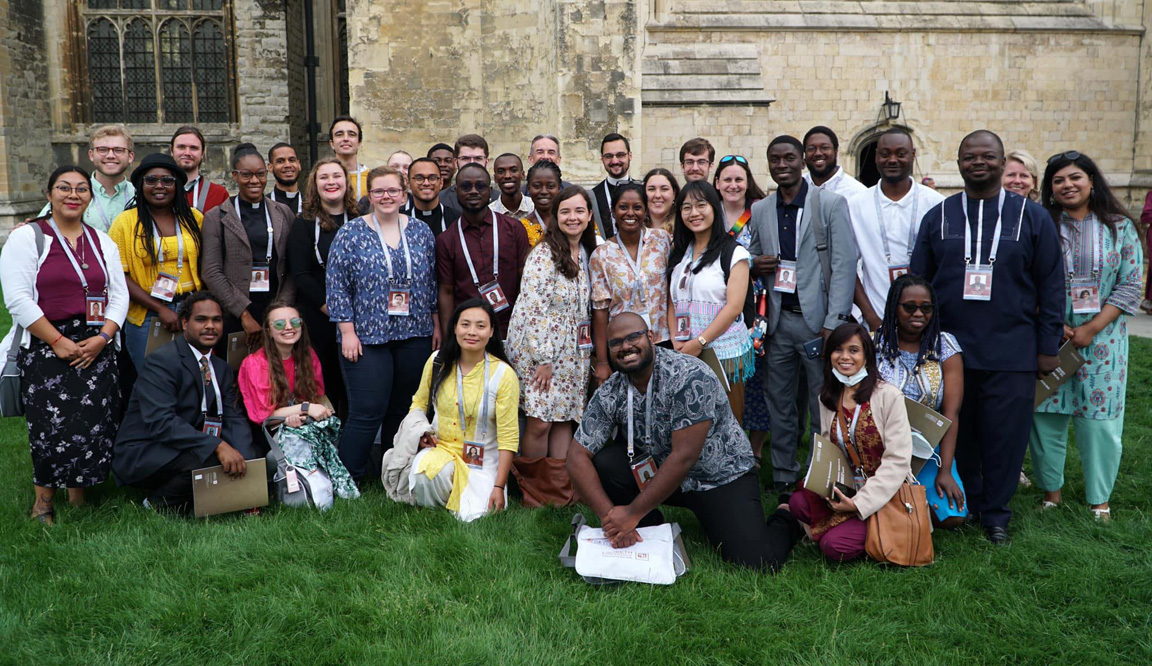
Volunteer stewards at Lambeth, men and women ages 20 – 30, helped keep the conference running smoothly. Ryan Macias of the Diocese of Los Angeles is pictured center left. Photo: Lambeth Conference
